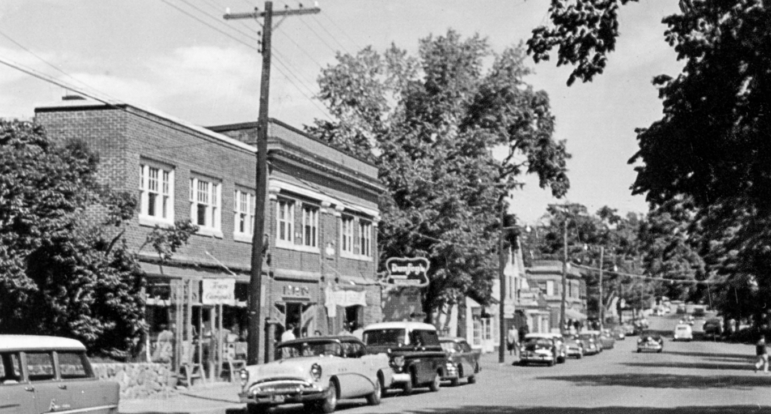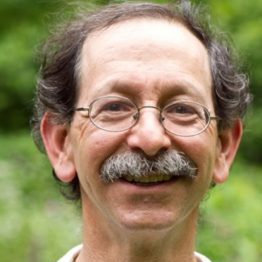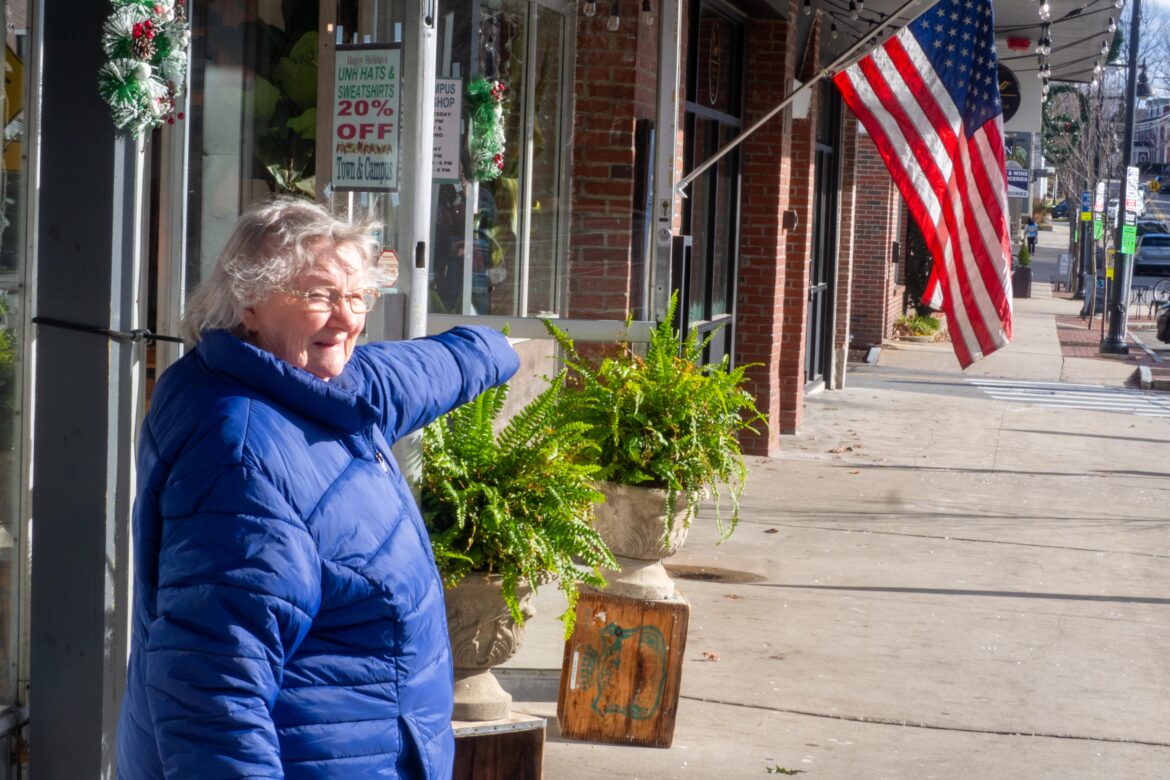
Above, this undated photo of downtown Durham shows roughly where the student protesters marched and what the town looked like in the late 1950s and early 1960s. Photo Courtesy of Eleanor Dunfey Freiburger
By Arnie Alpert, Active with the Activists

Arnie Alpert spent decades as a community organizer/educator in NH movements for social justice and peace. Officially retired since 2020, he keeps his hands (and feet) in the activist world while writing about past and present social movements.
DURHAM—At a service for David Diamond, a longtime peace activist from Dover who died in September, I learned that he had been arrested for refusing to take shelter during a civil defense drill in Durham in 1961, when he was a first-year student at the university. The full story is fascinating, in part because the punitive attitude of Governor Wesley Powell is disturbingly similar to the attitude of our current governor, Chris Sununu.
In a sense, the story starts six years earlier, when Dorothy Day and Ammon Hennacy, leaders of the Catholic Worker movement, refused to take shelter during the federal government’s first “Operation Alert” civil defense drill in Manhattan. The nuclear arms race was accelerating, and the Eisenhower administration was promoting fallout shelters to protect government officials and the general population in the event of nuclear war. The protesters maintained that the best course for survival would be to get rid of nuclear weapons, not create a false impression that nuclear war could be survived. Day, Hennacy, Bayard Rustin, A.J. Muste, and two dozen others were arrested. Operation Alert drills and corresponding demonstrations continued for several years.
In the spring of 1961, Robert Kingsley, a UNH grad student, learned about plans for civil defense protests in a newsletter from the Committee for Non-Violent Action (CNVA), a radical pacifist group, and decided to organize one in Durham. Kingsley had spent ten years in the Air Force, including service in Japan during the Korean War as well as training pilots to drop atomic bombs. But at some point, his ex-wife Margo LaPerle recalled in a recent interview, he decided he couldn’t do that anymore and left the Air Force.
In a letter published in the UNH campus newspaper, The New Hampshire, Kingsley announced that on April 28 at 4 p.m., the time of the nationwide alert, a group of students and local residents would “commence a non-violent and non-vocal walk up and down the main street of Durham.” Knowing that arrests might follow and wanting officials to understand the protesters’ commitment to nonviolence, Kingsley met ahead of time with the local police chief, a judge, and the Associate Dean of Students.
“When the alert sounds we will continue to walk,” Kingsley’s letter said. “We will refuse all orders to take shelter. If we should be arrested we will not resist the arresting officers. The purpose to the demonstration is to point up the inadequacy and insanity of our present nuclear defense policy. We invite others to participate in the protest.”
David Diamond was among those who accepted Kingsley’s invitation, as did Alice Nye, at the time named Alice Boodey, another first-year student.
Governor Wesley Powell took notice as well. “State troopers flooded the university town shortly before the 4 p.m. alert following orders from Governor Powell for ‘complete and adequate compliance,’” reported Fosters Daily Democrat, the local newspaper. Powell instructed the state’s civil defense director to take down the names of demonstrators and anyone who encouraged them to disobey the order to take shelter.
Hundreds joined the peaceful protest in downtown Durham, where about twenty reporters showed up to watch. As Steve Taylor, who at the time was editor of the The New Hampshire, recalls, “Anybody walking on the street was supposed to go into an adjacent building. If there was no building handy, you could climb into a parked car.” That’s what most everyone did when the orders came. But a band of people refused to take shelter and continued their march down Main Street, where “they were met by the New Hampshire state police.” Bob Kingsley and his wife Margo, pregnant and pushing a baby carriage, were at the front, Nye remembers.
“They were ordered to halt and to take cover,” Taylor recalled, “and they said, ‘No, we’re going to keep marching.’”
Calling refusal to take shelter “a matter of conscience,” Kingsley submitted to arrest, as did Diamond, Nye, and fifteen others. “They didn’t want to deal with pregnant ladies,” said LaPerle, now 87, who was left with her children and a mass of reporters on the sidewalk while the others were taken away by police officers.
The eighteen arrestees were charged with violating RSA 107, the Civil Defense Act, punishable by up to six months in jail and a fine of $100. They were also placed on academic probation by university officials for the remainder of the term.
Three days later, Governor Powell, an ex officio member of the university’s board of trustees, telegrammed Eldon Johnson, the UNH president, calling on him to expel the students. “It is my wish that you be aware of my strong personal opinion that the students who participated in the planned and open disobedience on Friday last should be promptly dismissed from the university.” In “this time of national crisis,” Powell said, expulsion of the disobedient students was “an action which should be obviously necessary.” The governor’s demand was reinforced by coverage in the Manchester Union Leader, which had long been on the watch for leftist activity on campus.
While Cold War tensions remained high, the excesses of the McCarthy era had faded in most of the country. But not in New Hampshire, where Dr. Willard Uphaus, the pacifist director of the World Fellowship Center in the White Mountains, was only sixteen months out of jail for refusing to turn over the Center’s guest list to Attorney General Louis Wyman’s inquiry into “subversive activities.” Wyman’s investigation had ended years before, but in the spring of 1961, legislators were debating a bill to establish a permanent “Division of Subversive Investigations” within the Department of Justice. And by chance, Uphaus and his wife had stopped by the home of UNH professor Gwynne Daggett on the eve of the protest. Kingsley and three other students were there for dinner.
Like Uphaus, Daggett had drawn the Attorney General’s attention. Never accused of being a Communist, Daggett had been associated with groups like the Progressive Party, had spoken at World Fellowship, and had even attended a meeting in Weare where Elizabeth Gurley Flynn was the guest speaker. The governor wanted to know whether Daggett was really the protest instigator and who else was at the professor’s home for dinner. Three other faculty members, named by the Union Leader, also fell under suspicion.
William O’Neill, an Assistant Attorney General, sent a letter asking David Knapp, who was Acting President at UNH while Johnson was on vacation, to order Daggett to divulge the names of any students who had been at the dinner. Later in the month, another Assistant AG, Richard Greenhalge, went to campus to interview President Johnson at length, as well as several protestors and Professor Daggett. His objective, in the words of Governor Powell’s “formal request,” was to determine whether “the University students who violated the civil law at Durham on Friday, April 28, 1961, were counseled to do so by the University faculty.”
Kingsley said consistently that Daggett and Uphaus had counselled against civil disobedience during the by then infamous dinner. He also pointed out that by informing police ahead of time of his plans for a peaceful protest, it was evident that the dinner was not part of some Daggett-led or Uphaus-inspired conspiracy. As LaPerle remembers, they were already committed to civil disobedience to protest nuclear weapons.
At trial, the 18 Durham protesters were fined $50 each, with $25 suspended. When UNH President Johnson decided against taking further action, Governor Powell said the university was “pampering” the students. William Loeb, the Union Leader publisher, called the UNH leadership “moral cowards” who were coddling lawbreakers. Loeb gave a blaring front page headline to the national leader of Veterans for Foreign Wars, who called for professors who advocate civil disobedience to be fired and said, “so-called pacifists are a greater threat than communists.” Berlin’s state senator called for high school students to take a class on the dangers of communism, with a required essay on “American freedom versus communist enslavement.” And a Portsmouth high school teacher who had attended the civil defense protest but had not been arrested was forced out of his job. In the climate of threats to university life and academic freedom, Nye said the student activists worried about what might happen next.
There may have been no conspiracy in a legal sense, but there was a plan, openly conceived and publicized, to undermine civil defense as a protest against preparation for nuclear war. The Civil Defense Protest Committee had formed in 1960 to increase participation in civil defense protests. One thousand people demonstrated in New York that year, with half refusing to take shelter. By 1961, attendance there had doubled, and 52 protesters were arrested. At the same time as the Durham protest, arrests took place on other campuses, too, including five arrests at Dartmouth. It would be the last year of Operation Alert. The Civil Defense Act would remain on the books until its repeal in 1987.
After the Durham trial, Kingsley flew to England to join the Committee for Nonviolent Action in further protests against nuclear weapons. Although Kingsley was not there at the end, a CNVA march that had started in San Francisco finally reached Moscow in October. In Red Square, a band of American and European pacifists called on the Soviet Union to do away with its nuclear weapons, just as they had demanded of American leaders. Two years later, President John F. Kennedy signed a treaty with the Soviet Union to halt atmospheric testing of nuclear weapons and the era of arms control had begun. UNH students, including Alice Nye, openly invited outside criticism by inviting controversial speakers to campus.
It’s too bad Chris Sununu and UNH leaders have not learned the lessons of history. Instead of accepting or even promoting the importance of peaceful dissent, the governor branded everyone involved in protests against the Gaza war last spring to be anti-Semites, directly intervened with UNH police, and sent State Police in riot gear to break up nonviolent encampments. University officials alleged the demonstration had been instigated by “outside groups.” Perhaps the new governor and the new UNH president will be more tolerant.
As for David Diamond, he pleaded guilty at trial and took four decades off from civil disobedience. But he never gave up his concern for peace and in 2002 he was arrested with four others at the office of Senator Judd Gregg protesting plans to wage war against Iraq. I think most readers will agree now that the Iraq war was misguided, based on falsehoods about weapons of mass destruction, and that the destabilization of the entire Middle East which followed has left us more insecure. Sometimes, civil disobedience is the right course of action.





